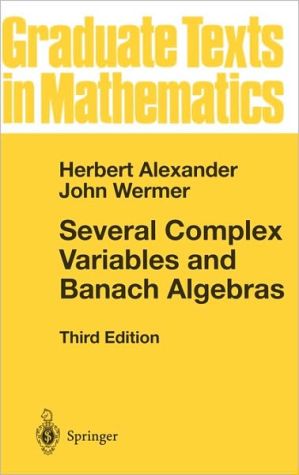Download Several Complex Variables and Banach Algebras PDF Free - Full Version
Download Several Complex Variables and Banach Algebras by Herbert Alexander, John Wermer in PDF format completely FREE. No registration required, no payment needed. Get instant access to this valuable resource on PDFdrive.to!
About Several Complex Variables and Banach Algebras
<p>During the past twenty years many connections have been found between the</p><p>theory of analytic functions of one or more complex variables and the study of</p><p>commutative Banach algebras. On the one hand, function theory has been used to</p><p>answer algebraic questions such as the question of the existence of idempotents in</p><p>a Banach algebra. On the other hand, concepts arising from the study of Banach</p><p>algebras such as the maximal ideal space, the ˇ Silov boundary, Gleason parts, etc.</p><p>have led to new questions and to new methods of proof in function theory.</p><p>Roughlyonethirdofthisbookisconcernedwithdevelopingsomeoftheprinci-</p><p>palapplicationsoffunctiontheoryinseveralcomplexvariablestoBanachalgebras.</p><p>Wepresupposenoknowledgeofseveralcomplexvariablesonthepartofthereader</p><p>but develop the necessary material from scratch. The remainder of the book deals</p><p>with problems of uniform approximation on compact subsets of the space of n</p><p>complex variables. For n > 1 no complete theory exists but many important</p><p>particular problems have been solved.</p><p>Throughout, our aim has been to make the exposition elementary and self-</p><p>contained. We have cheerfully sacrificed generality and completeness all along</p><p>the way in order to make it easier to understand the main ideas.</p><p>Relationships between function theory in the complex plane and Banach alge-</p><p>bras are only touched on in this book. This subject matter is thoroughly treated</p><p>in A. Browder’s Introduction to Function Algebras, (W. A. Benjamin, New York,</p><p>1969) and T. W. Gamelin’s Uniform Algebras, (Prentice-Hall, Englewood Cliffs,</p><p>N.J., 1969). A systematic exposition of the subject of uniform algebras including</p><p>many examples is given by E. L. Stout, The Theory of Uniform Algebras, (Bogden</p><p>and Quigley, Inc., 1971).</p><p>The first edition of this book was published in 1971 by Markham Publishing</p><p>Company. The present edition contains the following new Sections: 18. Subman-</p><p>ifolds of High Dimension, 19. Generators, 20. The Fibers Over a Plane Domain,</p><p>21. Examples of Hulls. Also, Section 11 has been revised.</p><p>Exercises of varying degrees of difficulty are included in the text and the reader</p><p>should try to solve as many of these as he can. Solutions to starred exercises are</p><p>given in Section 22.</p>
Detailed Information
| Author: | Herbert Alexander, John Wermer |
|---|---|
| Publication Year: | 1998 |
| ISBN: | 387982531 |
| Pages: | 265 |
| Language: | other |
| File Size: | 3.4485 |
| Format: | |
| Price: | FREE |
Safe & Secure Download - No registration required
Why Choose PDFdrive for Your Free Several Complex Variables and Banach Algebras Download?
- 100% Free: No hidden fees or subscriptions required for one book every day.
- No Registration: Immediate access is available without creating accounts for one book every day.
- Safe and Secure: Clean downloads without malware or viruses
- Multiple Formats: PDF, MOBI, Mpub,... optimized for all devices
- Educational Resource: Supporting knowledge sharing and learning
Frequently Asked Questions
Is it really free to download Several Complex Variables and Banach Algebras PDF?
Yes, on https://PDFdrive.to you can download Several Complex Variables and Banach Algebras by Herbert Alexander, John Wermer completely free. We don't require any payment, subscription, or registration to access this PDF file. For 3 books every day.
How can I read Several Complex Variables and Banach Algebras on my mobile device?
After downloading Several Complex Variables and Banach Algebras PDF, you can open it with any PDF reader app on your phone or tablet. We recommend using Adobe Acrobat Reader, Apple Books, or Google Play Books for the best reading experience.
Is this the full version of Several Complex Variables and Banach Algebras?
Yes, this is the complete PDF version of Several Complex Variables and Banach Algebras by Herbert Alexander, John Wermer. You will be able to read the entire content as in the printed version without missing any pages.
Is it legal to download Several Complex Variables and Banach Algebras PDF for free?
https://PDFdrive.to provides links to free educational resources available online. We do not store any files on our servers. Please be aware of copyright laws in your country before downloading.
The materials shared are intended for research, educational, and personal use in accordance with fair use principles.

